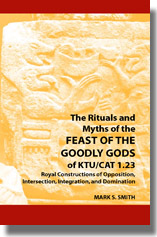
$27.00
In a fresh, in-depth study of the Ugaritic text often called “The Birth of the Beautiful Gods,” Smith applies the tools of detailed philological analysis and recent theoretical advances in the study of myth and ritual to illuminate this text as a sophisticated, integrated whole. In a series of rituals and myths, “The Feast of the Goodly Gods” captures a ritual moment of cosmic integration between the beneficial deities and the destructive cosmic enemies, in particular the gods after whom the text is named. This important volume not only brings the world of this fascinating Ugaritic text to life, setting it clearly within its royal context, but also provides a model for the integration of philological analysis and contemporary theories especially ritual studies in the interpretation of ancient texts, including the Bible.
“Mark Smith has once again put us in his debt, writing an erudite and comprehensive commentary on perhaps the strangest of all Ugaritic texts, telling of the death of Death, the voluptuous ‘ups and downs of El’s amours,’ and the birth of voracious devourers, all narrated in the ritual frame of a royal feast. Smith attacks this text with the full panoply of scholarly gear, including searching philological analyses, judicious critiques of previous work, and well-informed use of ritual theory. It is a model of precision and interpretive scope, and ought to be emulated by others working on Ugaritic and other ancient texts.”
—Ronald Hendel, Norma and Sam Dabby Professor of Hebrew Bible and Jewish Studies, University of California, Berkeley
”This study represents the first comprehensive investigation of CAT 1.23 in several decades. In contrast to many of his predecessors, Mark Smith not only provides a detailed philological commentary on the text, but also focuses much energy on exploring the complex relationship between its various ritual and narrative components. Drawing upon the work of C. Bell, J. Z. Smith and others, the author demonstrates the limitations of classic ‘myth and ritual’ approaches to CAT 1.23, and convincingly shows that evidence for sacred marriage rites in the text is entirely lacking. The book is refreshingly free of the kind of unwarranted speculation that has so frequently characterized scholarship on this text in the past. Up to date, wide-ranging, judicious, and fair, Smith’s is a work of mature scholarship. All future studies of CAT 1.23 will have to begin with his insightful investigation.
—Saul M. Olyan, Professor of Judaic Studies and Religious Studies, Brown University
“‘The Feast of the Goodly Gods’ is one of the most difficult of the Ugaritic texts, and Mark Smith’s edition of it is masterly. All of the well-known Smith trademarks are here: meticulous and exhaustive analysis; comprehensive control of the bibliography, both primary sources and modern scholarship; fresh and provocative re-thinking of all levels of the text, from particular points of grammar to overall organization and meaning. Smith’s convincing demonstration of the multiple mythic themes and rituals in the text, and his structuralist sensitivity to the intersecting tensions with which it deals reveal a depth and subtlety in this composition that go well beyond what previous interpreters had seen. From now on, this will be the volume on which all future discussions of ‘The Feast of the Goodly Gods’ will be based. Indeed, it will be a model for the study of Ugaritic literature in general.
—Peter Machinist, Hancock Professor of Hebrew and other Oriental Languages, Harvard University
Mark S. Smith is Skirball Professor of Bible and Ancient Near Eastern Studies at New York University. He has been a visiting professor at the Hebrew University in Jerusalem and the Pontifical Biblical Institute in Rome and has also taught at the École Biblique in Jerusalem, Yale University, and Saint Joseph's University. He is the author of numerous articles and books, including The Early History of God (Eerdmans), The Ugaritic Baal Cycle, Volume 1 (Brill), The Origins of Biblical Monotheism (Oxford University Press), The Memoirs of God (Fortress), and The Laments of Jeremiah and Their Contexts (Society of Biblical Literature).
